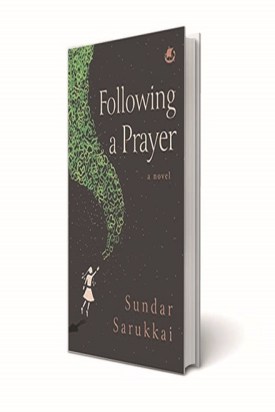When Afghanistan wan-ted to rebuild the country in the last decade following a long civil war that had flattened all the basic infrastructure, one suggestion particularly stood out. It was plain and simple—start with building schools. Sundar Sarukkai, the Bengaluru-based author who has spent a considerable amount of time teaching philosophy to students across the country, knows where real social progress begins. He puts a school at the centre of his first novel, Following a Prayer, in which three young children want to restart a conversation about knowledge. Though it doesn’t spell it out, the novel is clearly pointing in the direction of the current modern era where minds are mangled by misinformation, hate speech and fake narratives. It also alludes to the fact that most of the questions, as well as protests, in the country in the past few years have come from not political parties or trade unions, but school and college campuses.
Kalpana, Deeksha and Kumari are the novel’s protagonists whose sudden questions start to ruffle an entire system. Set in a sleepy village in the foothills of the Western Ghats in Karnataka, the young girls are students of a local school. At 12, Kalpana is the oldest. Deeksha is her younger sister and a classmate of Kumari. Following a Prayer begins with a traumatic event that upsets the calm of the village. Set out for school on a Monday morning, Kalpana doesn’t return home. Panicked by the disappearance of the young girl, her parents, villagers and police comb the entire area without any success. Three days later, Kalpana comes home dishevelled, wet and muddy. She had stopped talking.
It soon emerges that the girl had got lost in a forest on the periphery of the village while “following a prayer”. Kalpana had provoked her grandmother during her prayers by asking the question, “Where do your words go?” Irritated, the grandmother shouts a prayer into the wind and the clouds and tells Kalpana to “follow the words”. After her ordeal in the forest, Kalpana comes to believe that “language is a lie” and stops going to school. Her sister Deeksha takes up Kalpana’s fight on her behalf and enlists her classmate Kumari in her campaign to find answers about the flight of words. The result is a waking up of the classrooms to questions of the children curious to clear their doubts, like, “when you hear a word, do you also hear its meaning?” Their campaign widens when a new teacher, Gangamma, a nomadic singer of mostly medieval Kannada poetry about people more than gods, agrees to teach music to the three children.

Sarukkai, a philosophy professor who founded the Barefoot Philosophers collective four years ago to take philosophy to the public, taps the innocence and curiosity of children to address the challenges of a knowledge-driven contemporary society. In his previous book, Philosophy for Children: Thinking, Reading, Writing, published two years ago, Sarukkai prodded children to ask themselves questions like, “Do you think differently in your Hindi class and your English class? Is that thinking different from what you think when you are learning science and mathematics?”
The author continues the exercise in his novel through his young characters whose questions traverse a wider universe of religion, caste and community within the realm of reason. Sarukkai’s succinct prose aids him in probing a world that is condensed into gross miniatures by the deafening voice of the majority. Probably the right time for some philosophy for the public.
Following a Prayer: A Novel
Sundar Sarukkai
Tranquebar Press
Pp 240, Rs 599
Faizal Khan is a freelancer









